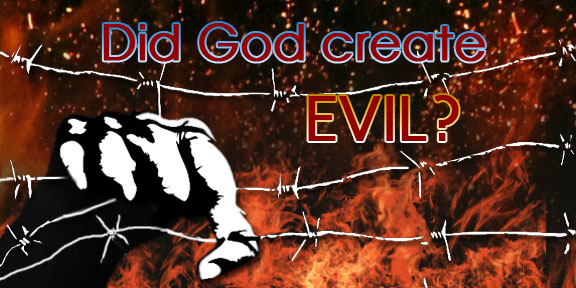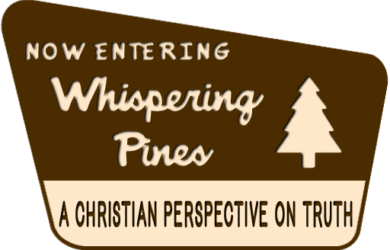It seems that perennially, with every new generation coming of age (becoming adults responsible for running civilization), this question surfaces: Did God create evil?

The uninformed thought goes, “If God created evil, it must be a part of Him, and when He says He is all good, He is lying, and He is evil”.
It’s a terrifying prospect that the one who created all things might be evil. But if that were the case, we would see more of that, and there would be no good.
There is a perennial anecdote that goes with this question, which we think illustrates the answer about whether God is evil or not:
An Anecdote To Illustrate Why God Isn’t Evil
A Professor of Philosophy at a university asked his students the following question:
Professor: Everything that exists was created by God?
Student: Yes, created by God.
Professor: Did God create everything?
Student: Yes, sir
Professor:
If God created everything, then God created evil since it exists. And according to the principle that our deeds define us, then God is evil.
The student became silent after hearing this answer. The professor was very pleased with himself. He boasted to the students that he had once again proved faith in God is futile.
Another student raised his hand and said:
Student: Can I ask you a question, professor?
Professor: “Of course”.
The student stood up and asked:
Student: Professor, is cold a thing?
Proffesor: What kind of question is that? Of course, it exists. Have you ever been cold?
(Students laughed at the young man’s question)
Student: Actually, sir, cold doesn’t exist. According to the laws of physics, what we consider cold is the absence of heat. A person or object can be studied to determine whether it has or transmits energy. Absolute zero (-460 degrees Fahrenheit) is a complete absence of heat. All matter becomes inert and unable to react at this temperature. Cold does not exist. We created this word to describe what we feel in the absence of heat.
The student continued:
Student: Professor, does darkness exist?
Professor: Of course, it exists.
Student: You’re mistaken again, sir. Darkness also does not exist. Darkness is actually the absence of light. We can study the light but not the darkness. We can use Newton’s prism to spread white light across multiple colors and explore the different wavelengths of each color. You can’t measure darkness. A simple ray of light can break into the world of darkness and illuminate it. How can you tell how dark a particular space is? You measure how much light is presented. Isn’t it so? Darkness is a term man uses to describe what happens in the absence of light.
In the end, the young man asked the professor:
Student: Sir, does evil exist?
This time, not as certain as he was before, the professor answered:
Professor: Of course, as I said before, we see it every day. Cruelty, numerous crimes, and violence throughout the world. These examples are nothing but a manifestation of evil.
To this, the student answered:
Student: Evil does not exist, sir, or at least it does not exist for itself. Evil is simply the absence of God. It is like darkness and cold—a man-made word to describe the absence of something. God did not create evil. Evil is not faith or love, which exists as light and warmth. Evil results from the lack of Divine love in the human heart. It’s the cold that comes when there is no heat or the kind of darkness that comes when there’s no light.
This story is often attributed to Albert Einstein’s experience with a professor. We find no concrete evidence that this is true, but the story nonetheless makes valid points concerning evil, good, and God.
More Questions Than Answers
Evil is simply the absence of good (or God). But why would that underlie our environment? Why would God create an environment in which evil is at its base? Perhaps a better observation is that God is good, and He overpowers the possibility of evil.

The professor in this story made several assumptions based on his own biases. Evil is not a created thing, so it doesn’t follow that God created evil.
Behavior Choices Do Not Define Who We Are
He assumed that there is a principle that says our behavior defines who we are, which is incorrect.
Actually, our behavior only defines the pattern of choices we have made. While there is merit to the idea that our choices are guided by what is in our hearts and minds, the fact that we can change our minds proves that our behavior choices don’t define who we are. So much of our behavior choice depends on our environment and the external inputs influencing decisions.
We may want to make different choices than we do under given circumstances, but the circumstances preclude making a better choice. Or, due to inexperience, we may make a poor choice that we later regret and wish we had made a different choice.
Experience brings wisdom, and both bring maturity and, thus, better choices. This is not always the case. Some people never develop maturity.
Our Choices Have Ramifications

An “always stay young” philosophy can harm a person’s maturity. It’s good to stay nimble and vibrant (and all the good, productive, and valuable things that embody youth), but it is a detriment when you lack the maturity to temper those things.
The fact that some of our choices bother us indicates what we are genuinely like underneath. Our choices don’t define us, but what lies underneath, deep in our hearts and minds—the part of us that isn’t easily exposed or understood (to others and ourselves) defines us. If we are drawn toward evil, that may define us more than making evil choices.
We are more drawn to God if we prefer goodness, love, and light. And aren’t these the things we all universally seek? The street minister Lonnie Frisbee once observed, “People are looking for all of the right things in all the wrong places” (referring to the fact that God supplies all of these things, not “drugs, sex, and rock-n-roll”).
God Gave People Free Will and Independent Ability to Make Choices
We see evil in the world because people sometimes make bad choices. Scripture tells us it has been that way since Adam and Eve committed the original sin. Does that mean people are all evil? We have to make that conclusion if we make the wrong assumption, like the professor in the anecdote above. But there is a better way to look at this.
The professor in our story assumed that God created evil. But God created people with free will and the ability to make their own decisions. People make decisions to be evil.
God is faithful to Himself; He is all good and perfect love.
There is a reason God set up our environment where the potential for evil exists. It’s linked to why God chose to remain invisible to us—unless we seek Him. See this link for a full explanation.
As the anecdote asserts, Evil is the absence of God. People without God in their hearts and minds commit evil acts, so yes, evil exists, but God neither created it nor is He a part of evil. He merely set up the physical universe so it was possible for people to make evil choices.
You may want to know why God made it possible for evil choices to be made in our environment. That’s a good, honest question.
For those having trouble imagining that we are eternal beings from a higher dimension temporarily housed in physical bodies in this temporal situation, we will ask you to suspend disbelief for discussion so that you might understand this perspective. Just pretend this is a fact for now.
Possible Reason For This Life’s Temporal Nature
Now, imagine that we are temporarily living in this physical universe for the sole purpose of building a testimony about our thoughts and inner feelings guided by our mind and heart. God wouldn’t want us influenced by His presence, so He allowed us to make our own choices without being directly involved with us by default.
It is easy to be unaware of God’s presence. It sets up an environment where people always make candid choices.
If our testimony were to be used to answer the question, “Why should I allow you to dwell in the Kingdom of Heaven?” we can readily see that how we lived our lives reveals the absolute truth in our hearts and minds and exposes the answer to that question.
Suppose we take the testimony of how we lived our lives with us when we die, and then we face God on Judgment Day, where God judges us based on our testimony (to answer the question above). Since we made our own choices, our lives testify to whether or not we accepted God.
It’s an ingenious way for God to demonstrate to us what our hearts and minds are and whether we want God in our lives for eternity. God knew us before we were even born so that the judgment process would be for our benefit (or our detriment, depending on how we lived our lives). It’s so we can see who we are through how we choose to live our physical lives; there is no denying the truth. There is no hiding from the facts.
Choosing God Over Temporal Distractions
Whether we choose God or not is essential where eternity is concerned. Choosing God means we will dwell with Him forever. Choosing evil means we spend eternity (a very long time) in outer darkness where, according to Scripture, there is wailing and gnashing of teeth. We associate those things with resentment and despondent sorrow. And that describes a place where those in it understand they made a very bad choice.
God, being the opposite of evil, doesn’t want evil in His Kingdom. That seems reasonable. He doesn’t want anyone to make the choice for evil, but He gives us each the opportunity to make the choices we will make.
The trouble is, people make choices they will regret—some permanent. Scripture tells us that God’s people are perishing because of their lack of knowledge. It goes on to say that He gave that knowledge to them but they rejected it.
God Is Not Evil
God didn’t create evil. It isn’t in His nature. Evil exists because we make bad choices and sin. This is just a spiritual reality. God wants companionship—family. It’s why He created us. God opposes evil; it’s not even in His nature. If we want to dwell with God eternally, we can’t have an evil nature. With God, all things are possible—including changing our nature.
God is good. Since He didn’t create evil, it is not a part of who He is.
But God doesn’t want companionship with puppets or beings who are slaved to His will. He wants it to be of our own volition. That’s why we have free will and the independent ability to make our own choices.
Evil is within the possible choices for human (and angel) behavior. This means those things must be bred out of us to enjoy God’s good and love for eternity.
If you would like to know how to ensure that your life is on track and that you are close to God, visit this page.

